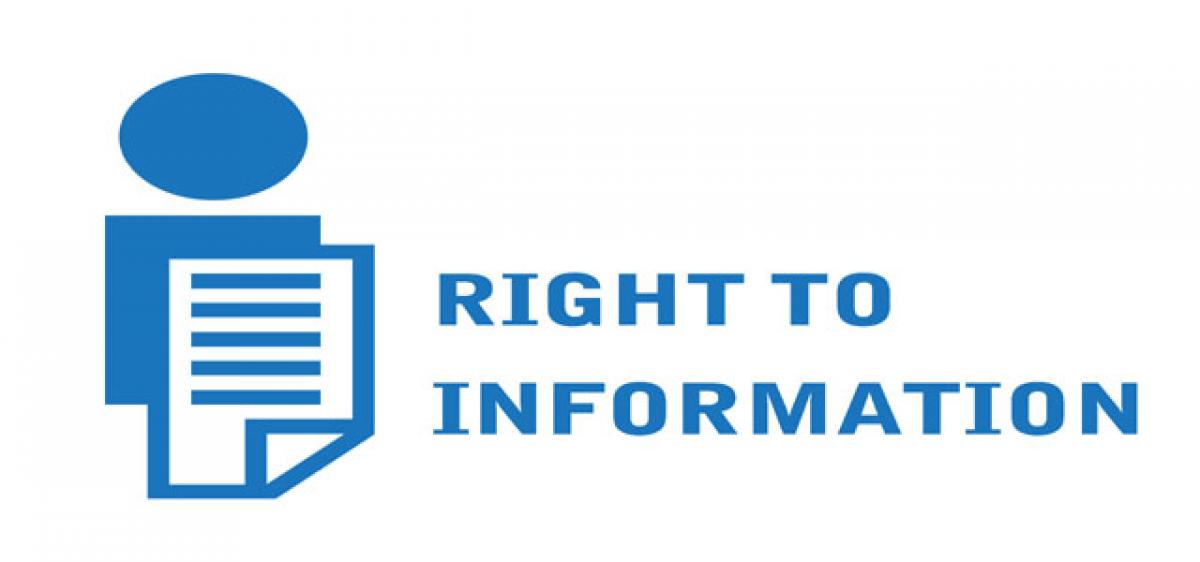Live
- Is US Prez weighing climate emergency declaration soon
- ‘AP people’ve made up their mind on double engine govt’
- Caught unawares: Dubai must brace for future storms
- DEO suspends teacher accused of sexual assault
- PM ‘cursing’ Congress out of despair: Maharashtra Cong Chief
- Applications are invited for Junior Colleges Scheme District Scheduled Castes Development Officer Ramlal
- A nomination was filed on the second day for the Nagar Kurnool parliamentary seat
- SP Gaikwad inspected the Telangana Amarnath Saleswaram Jatara yatra arrangements
- Rahul Gandhi's decision to contest from Wayanad shows 'lack of confidence': BJP President Nadda
- IPL 2024: Delhi bowlers will go after all of SRH’s top-order batters, says head coach Ricky Ponting
Just In

Any attempt to reduce the right to information in its size, content and power will harm the democratic system. The Department of Personnel and Training (DoPT) of Central government has placed draft RTI Rules, 2017, for public consultation, evoking huge response from all over the country, objecting to certain diluting proposals.
Any attempt to reduce the right to information in its size, content and power will harm the democratic system. The Department of Personnel and Training (DoPT) of Central government has placed draft RTI Rules, 2017, for public consultation, evoking huge response from all over the country, objecting to certain diluting proposals.
Ever since RTI advent, the powers-that-be are embarrassed as their hidden truths are being exposed ‘legally,’ not by leaks. The RTI resulted in official wikileaks. Sarkari wrong doers felt threatened with RTI in the hands of citizens.
Next to the Constitution of India, the impact of RTI is deep and widespread; perhaps, the RTI has overshadowed other fundamental rights. Amidst increasing density of darkness of ill-performance in three Estates and its branches, the RTI sparked a ray of hope.
If the PIL (public interest litigation) altered the chemistry of justice, the RTI petition in its 11-year sojourn assumed role as mini-PIL. A pensioner could correct mistakes or delay, or get it fixed without delay.
A ration card, bizli connection, town planning permission, caste certificate or correction of voter card, reasons for rejection in selection, review of failure in examination are some of the problems for which a common man cannot file PIL in High Court or Supreme Court. But an RTI will do.
The DoPT, being a nodal agency, has an onerous responsibility to make minute rules to make RTI to work, for instance, criterion of public authority (how a Governor or AG, being a Constitutional authority claims that he is not a public authority), rationale of exempting certain bodies (how a police-body like CBI could be exempted from RTI Act), the duties of First Appellate Authorities (most of them do not know their role), the authority of public information officers (they are not as subordinate clerks, and cannot be dictated to deny information), etc. Instead, the DoPT proposed to interfere with independence of the Central Information Commission.
It wanted to give Chief Information Commissioner the powers not given by the Act, to withdraw a case from one and post it before another Commissioner. If this is allowed, the Chief will be under constant pressure from political rulers to avoid a particular Commissioner fearing adverse orders.
Why not the DoPT frame rules for picking up independent commissioners from different walks of social service as prescribed under Section 12(4) to prevent Information Commissions from becoming rehabilitation centers for retired loyal administrators and inducement for officers about to retire? These rules desire that the Commission ‘shall withdraw.’ They will facilitate threats to applicants to withdraw an application or appeal.
As per law, civil liability never abates. Even a criminal case does not abate on death of complainant. Only on death of accused a criminal charge can die, because none can punish the dead. Jayalalithaa now cannot be jailed but her ill-gotten property can be confiscated. How can appeal for information abate on applicant’s death?
If this is allowed, it abets the corrupt to kill applicants who’s potential RTI would expose them. If civil society protects RTI, it protects social systems. Let not these rules become tools for rulers to kill the Rule of Law.

© 2024 Hyderabad Media House Limited/The Hans India. All rights reserved. Powered by hocalwire.com







